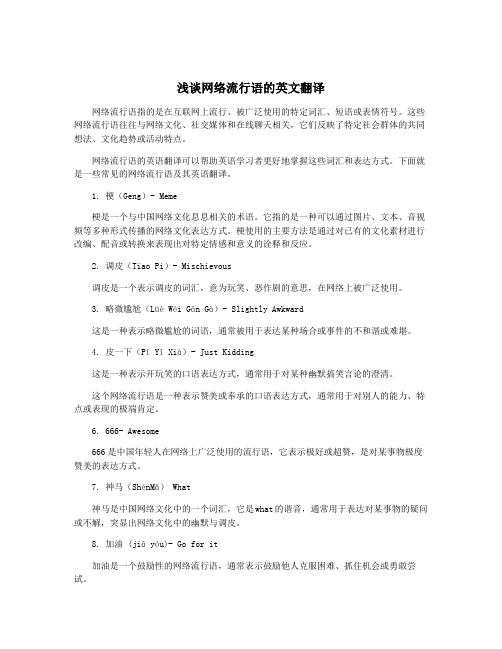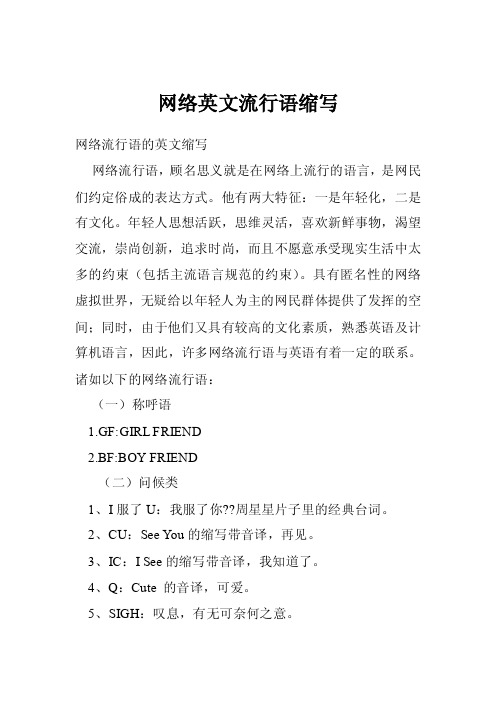网络流行语英文
15个流行语的英文你知道怎么说吗

15个流行语的英文你知道怎么说吗?这是个信息大爆炸的时代,为了紧随时尚的步伐,在这个大时代里的我们一不小心就成了低头族.吃饭、走路、睡觉、坐公交、挤地铁离不开手机。
几天不玩手机不上网,和别人聊天时就会发现自己成了 out man!暖男、照骗、打脸、懒人包、肥宅等15个流行语的英文你知道怎么说嘛?不知道的可以现学现卖,分分钟fashion 起来。
1. steal the show 抢风头也可用 steal the thunder 代替,不过steal the thunder 除了抢风头外,还有窃取他人创意或点子的意思。
Taylor Swift totally stole the show when she showed up at my birthday party.泰勒-斯威夫特一出现在我的生日派对上就把风头都抢走了.It is really unethical to steal the thunder from someone else.窃取他人的创意很不道德.2. go nuts 要疯了工作让人抓狂、消息让人疯掉等情景都可以使用,除了go nuts也可以用 go crazy。
After two days of nonstop working, our crew members went nuts.经过两天没日没夜的工作,组员们都快疯了.3. suck it up 忍着点工作不顺利、期末考难熬?suck it up 就是在鼓励人忍着点并撑过难关。
I know the finals are tough, but you just have to suck it up and deal with it.我知道期末考很不容易,但你就忍着点撑过去吧。
4。
slap in the face 打脸“打脸”一词其实很早就有了,今年特别流行,意思是找出别人的错事儿而使之丢脸出糗。
The mayor promised that he will finish his term, so it was a slap in the face when he announced to run for president。
浅谈网络流行语的英文翻译

浅谈网络流行语的英文翻译网络流行语指的是在互联网上流行、被广泛使用的特定词汇、短语或表情符号。
这些网络流行语往往与网络文化、社交媒体和在线聊天相关,它们反映了特定社会群体的共同想法、文化趋势或活动特点。
网络流行语的英语翻译可以帮助英语学习者更好地掌握这些词汇和表达方式。
下面就是一些常见的网络流行语及其英语翻译。
1. 梗(Geng)- Meme梗是一个与中国网络文化息息相关的术语。
它指的是一种可以通过图片、文本、音视频等多种形式传播的网络文化表达方式。
梗使用的主要方法是通过对已有的文化素材进行改编、配音或转换来表现出对特定情感和意义的诠释和反应。
2. 调皮(Tiao Pi)- Mischievous调皮是一个表示调皮的词汇,意为玩笑、恶作剧的意思,在网络上被广泛使用。
3. 略微尴尬(Lüè Wéi Gān Gà)- Slightly Awkward这是一种表示略微尴尬的词语,通常被用于表达某种场合或事件的不和谐或难堪。
4. 皮一下(Pí Yī Xià)- Just Kidding这是一种表示开玩笑的口语表达方式,通常用于对某种幽默搞笑言论的澄清。
这个网络流行语是一种表示赞美或奉承的口语表达方式,通常用于对别人的能力、特点或表现的极端肯定。
6. 666- Awesome666是中国年轻人在网络上广泛使用的流行语,它表示极好或超赞,是对某事物极度赞美的表达方式。
7. 神马(ShénMǎ) What神马是中国网络文化中的一个词汇,它是what的谐音,通常用于表达对某事物的疑问或不解,突显出网络文化中的幽默与调皮。
8. 加油(jiā yóu)- Go for it加油是一个鼓励性的网络流行语,通常表示鼓励他人克服困难、抓住机会或勇敢尝试。
9. 方便面( Fāngbiànmiàn) – Instant Noodles方便面是网络流行语,表示解决问题或商讨问题的速度极快的表述方式。
2024年网络十大流行语作文

2024年网络十大流行语作文英文回答:In the year 2024, the internet is bound to be filledwith new and exciting slang and catchphrases. As a language enthusiast, I am always fascinated by the evolution of language and the emergence of new words and phrases. Inthis essay, I will discuss the top ten popular internet slang and catchphrases in 2024.1. "LOL" This acronym stands for "laugh out loud" and has been around for quite some time. However, in 2024, it has evolved to take on a new meaning. People now use "LOL" not only to express laughter but also to convey sarcasm or irony. For example, if someone makes a ridiculous statement, you might respond with "LOL, as if!"2. "AF" Short for "as f," this phrase is used to emphasize something. It is often added after an adjectiveto intensify its meaning. For instance, if something isextremely funny, you could say "That joke was hilariousAF!"3. "Savage" This term is used to describe someone who is brutally honest or has a cutting sense of humor. It is often used in a positive way to praise someone's wit or cleverness. For example, if someone delivers a clever comeback, you might say, "Wow, that was savage!"4. "FOMO" This acronym stands for "fear of missing out" and is used to describe the anxiety or uneasiness one feels when they think they are missing out on an exciting or interesting event. For instance, if you see your friends having a great time at a party and you couldn't attend, you might say, "I have serious FOMO right now!"5. "YOLO" Short for "you only live once," this phrase is used to encourage people to take risks and live life to the fullest. It is often used as a justification for doing something adventurous or spontaneous. For example, if someone suggests going on a spontaneous road trip, you might respond with "YOLO, let's do it!"6. "Ghosting" This term refers to the act of suddenly ending all communication with someone, especially in the context of dating or relationships. It is often done without any explanation or warning. For instance, if someone stops responding to your messages and disappears without a trace, you might say, "I can't believe he ghosted me!"7. "Facepalm" This term is used to express frustration or disappointment in someone's actions or words. It is often accompanied by a physical gesture of placing one's hand on the face. For example, if someone says something incredibly foolish, you might respond with a facepalm and say, "I can't believe you just said that!"8. "Lit" This term is used to describe something that is exciting, enjoyable, or impressive. It is often used to describe parties, events, or experiences. For instance, if you attend a concert and have an amazing time, you might say, "That concert was lit!"9. "Throw shade" This phrase is used to subtly insult or criticize someone. It is often done in a sly or indirect manner. For example, if someone makes a snide remark about your outfit, you might respond by throwing shade back at them.10. "Binge-watch" This term refers to the act of watching multiple episodes of a TV show or an entire season in one sitting. It has become increasingly popular with the rise of streaming platforms. For instance, if you spend an entire weekend watching a new series, you might say, "Ijust binge-watched the entire season!"中文回答:2024年,网络上必然充斥着新奇有趣的流行语和口头禅。
网络流行语的英文缩写

12. MOP=猫扑~
13.牛 B:又作NB,牛X之意
14.In or Out:流行或者过时,2003年,“IN──北上内地”和“OUT──移民海外”也就格外流行。
15. AA制:经济模式
传统意义上的AA制大家都非常明白了。只是当你听到:“亲爱的,让我们AA制”时,这就是近来流行的一种新的家庭经济模式了。大体有两种形式,一种是每月各交一部分钱作为“家庭公款”,以支付房租水电费等,其余各自料理;另一种是请客、购物、打车等费用自理,只在买房、投资等大项目上平均负担。
5、DIY:Do It Yourself的缩写,自己动手做的意思。
6、BUG:原意是:臭虫,后来把跟电脑有关的故障都称之为(BUG)。
7、FT:分特,Faint的缩写,昏倒、晕厥之意。
8、SP:support,支持。
9.败:buy的音译,购买的意思。
10.KFC:Kill fu*king customers。
21. Moonlighter:月光人
Moonlight原意为月光,引申为“从事第二职业”,比如“She has been moonlighting as an accountant at a restaurant in the evenings.”意思是:她晚上在一家餐馆做兼职会计。说来也是,既然是兼职,当然白天得先做好本职工作,只能等月亮升上天后,才有空做第二职业,所以兼职者又称“moonlighter”,也就是“月光人”。
7、BTW:By the way,顺便说一句。
8、BRB:Be right back,马上回来。
9、TTYL:Talk to you later,回头再谈。
10、BBL:Be back later,过会儿就回。
网络流行语英文PPT

2015年即将要过去了。
回首一年,都有哪些网络流行语红极一时呢?你知道用英文怎么讲嘛?跟小编一起看看吧!1. 上交给国家(handover sth to the government)“上交给国家”出自电视剧版《盗墓笔记》,为了能顺利过审,主角吴邪一改原著中的盗墓说辞,改成将所有看到的文物“上交国家”,于是片中的所有宝藏,都摆脱不了“上交国家”的命运,由此引发原著粉和看剧党的大规模的吐槽。
这个词组也是属于中国特有滴,所以小编认为直译会比较靠谱,即为handover sth to the government 或者说handover sth to the authority,你觉得呢?2. 吓死本宝宝了(scared to death)“吓死宝宝了”这里的“宝宝”指的是自己,是吓死我了的意思,自称本宝宝只是为了卖萌,说自己很可爱!可以译成im scared to death或者说it scared my pants off!3. 明明可以靠脸吃饭(could have earned a living with face)小编认为这句话用英语表达就是:she could have earned a living with face, but instead, she uses her talent.4. 世界那么大,我想去看看 (the world is big and i want to see it.)5. 睡什么睡,起来嗨(wake up and get high with us!)6. 重要的事情说三遍 (important things cannot be underscored too much.)最早说的应该是某房地产网站的电台广告语:“走直线,走直线,走直线,重要的事情说三遍。
”此广告一经推出,迅速火遍各大电台,重要事情说三遍被各类广告和跟风使用,洗脑作用可见一斑。
7. 傻白甜 (blonde)傻白甜通常指电视剧或电影中的女主角,蠢萌没有心机,后用来形容没有演技的角色。
网络英文流行语缩写

网络英文流行语缩写网络流行语的英文缩写网络流行语,顾名思义就是在网络上流行的语言,是网民们约定俗成的表达方式。
他有两大特征:一是年轻化,二是有文化。
年轻人思想活跃,思维灵活,喜欢新鲜事物,渴望交流,崇尚创新,追求时尚,而且不愿意承受现实生活中太多的约束(包括主流语言规范的约束)。
具有匿名性的网络虚拟世界,无疑给以年轻人为主的网民群体提供了发挥的空间;同时,由于他们又具有较高的文化素质,熟悉英语及计算机语言,因此,许多网络流行语与英语有着一定的联系。
诸如以下的网络流行语:(一)称呼语1.GF:GIRL FRIEND2.BF:BOY FRIEND(二)问候类1、I服了U:我服了你??周星星片子里的经典台词。
2、CU:See You的缩写带音译,再见。
3、IC:I See的缩写带音译,我知道了。
4、Q:Cute 的音译,可爱。
5、SIGH:叹息,有无可奈何之意。
6、LOL:Laugh Out Loud,大笑。
7、BTW:By the way,顺便说一句。
8、BRB:Be right back,马上回来。
9、TTYL:Talk to you later,回头再谈。
10、BBL:Be back later,过会儿就回。
11、kick your ass:打你屁屁。
12、PPL:people,人们。
13、PLZ:please,请,也有缩写成PLS。
14、RUOK:Are you OK?15、IOWAN2BWU:I only want to be with you。
16、M$ULKeCraZ:Miss you like crazy。
17、CUL8R:see you later。
18、IMHO:In my humble opinion。
19,ME TOO: 我吐20.CYA:SEE YOU21.R U O K:ARE YOU OK?22.白白:再见23.OIC: OH,I SEE.24.OICQ: OH ,I SEEK YOU.(三)与数字有关的用语1.886:BYE BYE2.3Q:THANK YOU.3.419 :for one night 一夜情(根据英语发音)(四)其它用语1、BT:①Bit Torrent的缩写,是一种P2P(点对点)共享软件2. BBS~:波霸(BIG~breast~sister)~3、SOHO:Small Office Home Officer的简称,意思是:在家办公。
emo意思网络用语

emo作为一个网络流行语,现在用来表示人的负面情绪状态,例如抑郁、不开心、悲伤、失落等。
也可以将“emo”解释为英文emotional(情感的,情绪激动的)的缩写。
在悲伤的基调下,一切的情绪不稳定皆可“emo”
例如:“我emo了”意在表达一种颓废、低落、不开心的情绪,是一种间接性的失落情绪的表达。
emo起源:
emo原本是一种情绪化的音乐风格,但在互联网上,逐渐的衍生出“丧”“忧郁”“伤感”等多重含义。
从上世纪90年代末00年代初开始,“emo”就已经存在。
只不过,在那个时间段,“emo”指代的含义还比较单一,是emocore的简写,全称是Emotional Hardcore,即情绪硬核或情绪化硬核。
2000年后,“emo”文化传入日本、中国,并风靡一时,影响着当时的年轻人。
大众所熟知的“杀马特”,就是“emo”的本土化产物。
此后一段时间,中国国内外的“emo”风陷入沉寂。
2021年,在各种因素的影响下,“emo”再次受到关注,并成为当代青年人所谓的“丧”文化的一种标签。
英文网络流行语系列一

英⽂⽹络流⾏语系列⼀
今天给⼤家介绍⼏个外⽹社交平台⽹友们常⽤的流⾏词汇。
simp
“simp”的英⽂解释是“It is when a male is overly submissive to a female and gains nothing from it.”意思就是⼀个男⼈为了得到⼀个⼥⼈的注意,会不顾⼀切,愿意做⽜做马,但是最后什么也得不到。
我想聪明的⼩伙伴已经猜到了,就是中⽂⾥的“舔”了,“舔舔到⼀⽆所有”是不是很形象。
By the
way,“simp”是⼀个名词,不过也会有⼈把这个词当做动词来⽤,⽐如,“Stop simping, dude. 别舔了,伙计。
”
sus
“sus”是suspicious的缩写,所以这个词的意思就是“可疑”。
⽐如,和朋友出去吃饭,快该结账的时候,他突然给你来个“哎呀,不胜酒⼒,不胜酒⼒~”想装醉逃避买单,这时你⼼⾥估计就会想“Hmm……that’s kinda sus……”。
这个词是从Steam游戏“Among us 太空狼⼈杀”中来的,外国队友经常⽤
sus(颜⾊+sus表⽰谁有嫌疑),玩过的可以举个⼿。
- 1、下载文档前请自行甄别文档内容的完整性,平台不提供额外的编辑、内容补充、找答案等附加服务。
- 2、"仅部分预览"的文档,不可在线预览部分如存在完整性等问题,可反馈申请退款(可完整预览的文档不适用该条件!)。
- 3、如文档侵犯您的权益,请联系客服反馈,我们会尽快为您处理(人工客服工作时间:9:00-18:30)。
five let it go!
2.no do no die why you try you try you die don't ask why just do it! 3.No zuo no die why you try 4.You try you die don’t ask why 5.No try no high give me five 6.Why try why high can’t be shy 7.You shy you cry still go die 8.No zuo no die don’t be shy
Does your family member know
Originated from a netizen who watch news broadcast in Internet cafes:” you are in such a dick, does your family member know?” Then spread from mouth to mouth and it quickly became a popular language of network. Derivative pet phrase: 1. LZ you are so dick, does your family member know? 2. Every day you wear a mask, does your family member know? 3. The exam hang up again, does your family member know? 4. You laugh like deliration everyday in microblog, does your family member know?
language of network. The normal usage of it is first be poker-faced to tell a story, then at the end of the story guide to the "mining" "digging" and other related words, later evolute to “then came the question that which school is proficient in excavator Technology”, which makes the word be used more widely
ANNUAL NETWORK HOT WORDS
As a form of culture , the network hot words has the characteristics of grass-roots culture, refracting youth groups’ life ideal and the life attitude ,which is a medium of exchange in the best common discourse
Having money is capricious
Few people know the source of this sentence. In fact, the popular language originates with fraud events. A man was in the knowing that
entire 2014 year , only for reference.
Under mountain-like pressure
Under mountain-like pressure, homonym the name of Alexander, is using a humorous method to express that Pressure is as large as a mountain . This phenomenon is widespread in the white-collar of metropolis, especially some north drifters and south drifters . They have no roots in the local cities , so the pressure they faced is larger than a lot of local people . Performance : 1. The heavy mortgage is oppressive that the pressure is too much . 2. The work is frustrated , let oneself extremely unhappy so that the pressure is too much . 3. Marital strife, let a person have no place to vent so that the pressure is too much . 4.Seeing others have houses and cars but oneself have nothing that the pressure is too much 5.Marriage relate to houses, there’s no wife if you have no houses that the pressure is too much. 6.The only child need to support their elders and raise children so that the pressure is too much .
9.You shy you die you can try
It is pretty spell
Network terminology, show the mean that you do something very hard, or
you failed though you worked hard. The network language comes from the
system .What its pursuit is not the grand narrative in the
solid system, but just improvise on the expression of mood at that time.
Review the 2014, which hot words left a deep
பைடு நூலகம்
Which school is proficient in excavator technology
This is Lan Xiang technical school enrollment advertising language, Initially appear only in the Post Bar , Later evolved into the popular
thread of the hit series of IDG Arts, White campus Belle and long legs. And then comes through the "Daddy where 2“, Gary’s mouth to make it carry forward. It has been well known on the Internet and widely spread. Since it has been widely spread, some people have used the expression without the intent meaning of “even you do something very hard, or you failed though you worked hard“. Some speakers use the main expression to taunt, ridicule or contempt some event they said. For example, the news: [Use the hammer to tamp ATM machine “to withdraw money“, boy you are also very pretty spell ! Another one in City Evening News: [Yoga practice went into this, it is pretty spell ! When iphone6 was recently listed, fans have to stand in line to buy. This phnomenon was ridiculed by net friends: it is pretty spell !
No zuo no die
No zuo no die is a popular language of network, meaning going looking
for trouble and it finally turn out to be shit. At present, it’s widely popular in the community, forum and even the mainstream media. This year, “No zuo no die” was incorporated into American Internet Slang Dictionary. The provenance of it is the twelfth set of Animax(高达).
